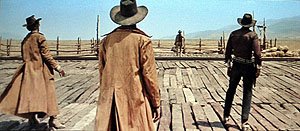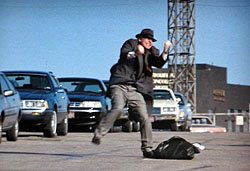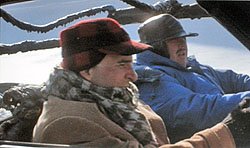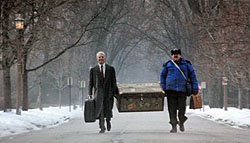Now located at Piddleville:
http://piddleville.com
(See post below.)
February 10, 2007
January 14, 2007
The Burble in transition
 I'm in the process of making changes (I may have mentioned this already) and the change really amounts to this: The Burble is moving to Piddleville.
I'm in the process of making changes (I may have mentioned this already) and the change really amounts to this: The Burble is moving to Piddleville.Piddleville is actually where it began. And if I could get the technical gobble-dee-gook worked out, this whole site would be there now. But all in good time ...
In the meantime, Piddleville is where I am now.
If you have this page linked, thank you, very much. Please do me a favour and change that like to Piddleville: http://piddleville.com
And I will shortly be posting about some old movies that will scheduled to land in Piddleville any day now.
December 10, 2006
Captain Jack, Columbo and Cicely
 Well, I still don't have a new home so I'm living out of a suitcase and that means I don't have my TV or my DVDs and that explains, in part, why there have been so few updates here. But ya know ...
Well, I still don't have a new home so I'm living out of a suitcase and that means I don't have my TV or my DVDs and that explains, in part, why there have been so few updates here. But ya know ...I haven't been completely bereft. I've been watching Columbo: the Complete Sixth & Seventh Seasons and also watching Slings & Arrows: Season 2 ... on my computers. So the screens have been smaller but the shows have been fabulously enjoyable. Big thumbs up for both. (This means I've the complete Columbo series now and, if things keep going as they have been, I'll have the complete Slings & Arrows series if and when it ends.)
And now I've Pirates of the Caribbean: Dead Man's Chest. It's going to kill me to watch it on a laptop but, without my TV, that's how it must be. C'est la vie. I'm looking forward to it, though (even on a laptop) as Gore Verbinski is one of my favourite directors. He has a great sense for telling stories.
I also picked up Northern Exposure: the Complete Fifth Season. Just because.
And that's my update. I live. I post. Just not so often as before ... but that will correct itself eventually. Once all the life nonsense is settled.
November 12, 2006
A post to update things
On the right my profile is not showing my updated info so this post is mainly to see if by posting I can get it to appear. I have moved. My location is now Fredericton, New Brunswick. I have left Edmonton and moved east.
Will my Blogger profile reflect this? Let's hope so.
Will my Blogger profile reflect this? Let's hope so.
October 22, 2006
To go ... or 'To Be'? A brief update
 I haven't posted on The Burble in a while because I'm in the process of a major change, which you can catch up on at Writelife. In the meantime, I saw a reference to 1942's To Be or Not To Be (Carole Lombard, Jack Benny) so it thought I'd highlight a review I did on that some time ago. It went this way:
I haven't posted on The Burble in a while because I'm in the process of a major change, which you can catch up on at Writelife. In the meantime, I saw a reference to 1942's To Be or Not To Be (Carole Lombard, Jack Benny) so it thought I'd highlight a review I did on that some time ago. It went this way:Prior to its DVD release, I knew nothing about the movie To Be Or Not To Be. When it came out, I was excited because I saw it had been directed by Ernst Lubitsch (Trouble in Paradise, The Shop Around the Corner) - one of my favourite directors of older movies.
Then I saw it starred Corole Lombard ...
(Read more ...)
Tag: Classic Film, Movie Classics, Movies, DVDs, Carole Lombard, Jack Benny
September 2, 2006
A mesmerizing movie about westerns
 I watched one of favourite westerns again last night, Once Upon a Time in the West. So I thought I'd repost this. I wrote it a couple of years ago - whenever the two disc DVD set came out. (And a great DVD set it is - and so cheap now!) ...
I watched one of favourite westerns again last night, Once Upon a Time in the West. So I thought I'd repost this. I wrote it a couple of years ago - whenever the two disc DVD set came out. (And a great DVD set it is - and so cheap now!) ...From it’s incredible opening to the closing credits, Once Upon a Time in the West is a mesmerizing movie about westerns. In a way, it isn’t even about westerns it simply evokes them with a stream of iconic images.
The movie takes a simple, almost cookie cutter story, and uses it as a basis (and excuse) for a film that is essentially concerned with western myths and iconography. (Sergio Leone had done this before, as in The Good, the Bad and the Ugly.)
It’s a post-modern film; it takes a kind of deconstructionist approach to movie-making (which may seem a tiresome idea today but was unusual in 1969).
 At the centre of the film’s narrative is Claudia Cardinale as Jill. Around her three other characters revolve: Henry Fonda as Frank, Jason Robards as Cheyenne and Charles Bronson as the man with no name (often referred to as Harmonica).
At the centre of the film’s narrative is Claudia Cardinale as Jill. Around her three other characters revolve: Henry Fonda as Frank, Jason Robards as Cheyenne and Charles Bronson as the man with no name (often referred to as Harmonica).The owner of a railroad company, Morton (Gabriele Ferzetti), hires a psychotic gunfighter, Frank (Henry Fonda) to get rid of anyone in the way of the completion of his railroad. Frank does, by massacring the family of new bride, ex-whore, Jill.
With her new family dead, Jill must decide what to do with the land she has inherited. It seems worthless but proves to be very valuable, so valuable it is the reason her family has been killed. It’s a basic western formula: bad guys after the good guy’s land. He must defend it and himself, except in this case “he” is “she.”
 At the same time, bad-guy Frank starts being stalked by a mysterious stranger (Charles Bronson). Frank doesn't recognize him, he has no idea what the stranger wants. As for Jason Robards' Cheyenne, he gets involved in all of this because Frank has framed him for the killing of Jill's family.
At the same time, bad-guy Frank starts being stalked by a mysterious stranger (Charles Bronson). Frank doesn't recognize him, he has no idea what the stranger wants. As for Jason Robards' Cheyenne, he gets involved in all of this because Frank has framed him for the killing of Jill's family.For a film almost three hours long, it doesn’t seem much to work with. But Leone is interested in the storyline only to the extent that it provides him something to improvise on western themes and imagery. He plays with these and it is what he does with them that makes this such a great movie.
I can't imagine how this would look in pan-and-scan form. Leone makes incredible use of the screen's width, visually stretching it out with foregrounds oriented to one side and breathtaking backgrounds to the other.
He also contrasts the breadth and spaciousness of his wide shots with the most extreme of close-ups. He shoots human faces almost as if they, too, were landscapes. The opening sequence is a spectacular example of this as he lingers on the bored killers' faces. He shows us every detail from lines to whiskers. You almost get the sense he uses only two shots - very close or very long.
He also uses his trademark technique of drawing scenes out to their absolute limit. The opening goes something like eight minutes before anyone says anything and it is a scene simply about three guys waiting at a train station. You get an almost visceral sense of their tedium.
 With scenes like gunfights, they are choregraphed to evoke iconic imagery and are paced, again, incredibly slowly to draw them out to their limits. When violence does erupt, it is explosive and very brief. Leone has little interest in violence itself but is obsessed with its rituals.
With scenes like gunfights, they are choregraphed to evoke iconic imagery and are paced, again, incredibly slowly to draw them out to their limits. When violence does erupt, it is explosive and very brief. Leone has little interest in violence itself but is obsessed with its rituals.Whether the movie is about anything is debateable. Leone seems interested primarily in style and evoking the western. (Once Upon a Time in the West is littered with references to earlier Hollywood westerns like High Noon, The Searchers and numerous John Ford films. It's even partly shot in Monument Valley where Ford shot so many of his westerns.)
If there is a comment in the film, perhaps it is a critique of myths of America. In the film, everyone is dissatisfied. Everyone wants something more, from the railroad baron and his hired killer Frank, to the woman Jill and Jason Robards. In the land of the free, no one seems to be content with their lot (except, perhaps, for the murdered McBain.)
 There may be something to the use of the railroad, too. Its arrival signals the end of the mythological West and the beginning of the modern age in the last American frontier. The train represents encroaching European civilization and the end of the mythical West, just as the film Once Upon a Time in America is a eulogistic end of the western.
There may be something to the use of the railroad, too. Its arrival signals the end of the mythological West and the beginning of the modern age in the last American frontier. The train represents encroaching European civilization and the end of the mythical West, just as the film Once Upon a Time in America is a eulogistic end of the western.But in the end, the film is simply a great homage to westerns, as well as a kind of eulogy to them. It's a stream of riveting images; an almost symphonic evocation of filmmaking style.
Tags: Movies, DVD, Once Upon a Time In The West, Sergio Leone, Western
August 24, 2006
Planes, Trains and Automobiles - revisited
 This is another one of those movies that I've lost track of the number of times I've watched. But over the years, yes, I've watch Planes, Trains and Automobiles a lot. The performances are great, the pacing is bang on and it never, ever, loses its focus. Yes, it's a pretty simple story but that's where a lot of its power comes from.
This is another one of those movies that I've lost track of the number of times I've watched. But over the years, yes, I've watch Planes, Trains and Automobiles a lot. The performances are great, the pacing is bang on and it never, ever, loses its focus. Yes, it's a pretty simple story but that's where a lot of its power comes from.Anyway ... I watched it again last night. So I decided to post this, a review I threw together a few years ago:
What a joy it is to watch a movie you had forgotten about and weren't expecting a lot from, to discover it is nothing less than wonderful. Planes, Trains and Automobiles is an absolute gem of a movie. Perhaps one of the reasons it succeeds so well is because it is so simple and maintains its focus.
 Steve Martin (Neal) is heading home to Chicago for Thanksgiving. So is John Candy (Del). They are travellers with personalities at opposite ends: Neal is a prim and proper, an anal businessman, while Del is a talkative, somewhat crass low-rent guy who sells shower curtain rings. Circumstances, increasingly ludicrous yet believable, keep throwing them together. Martin's character feels nothing but irritation about his situation and Candy's character while Candy's Del is oblivious - he just goes with the flow. Together, they take planes, trains, cars, trucks and so on as they try to get home.
Steve Martin (Neal) is heading home to Chicago for Thanksgiving. So is John Candy (Del). They are travellers with personalities at opposite ends: Neal is a prim and proper, an anal businessman, while Del is a talkative, somewhat crass low-rent guy who sells shower curtain rings. Circumstances, increasingly ludicrous yet believable, keep throwing them together. Martin's character feels nothing but irritation about his situation and Candy's character while Candy's Del is oblivious - he just goes with the flow. Together, they take planes, trains, cars, trucks and so on as they try to get home.It's a variation of the buddy, road-movie type of film. But I think it shows why these kinds of movies are so popular when they're well done. It is all about the characters and their relationship. In this case, Steve Martin and John Candy are a perfect pairing. I've always liked Martin best when he plays more of a straight character. In this film, he plays straight though this doesn't mean he's not comedic. On the contrary, he is more comedic because of this. Everything happens to him and his reactions are priceless.
Candy, on the other hand, has never been more loveably obnoxious. He's the boob, the stooge. Always well-intentioned, almost everything he does causes disaster for Martin's Neal. It's very much a Laurel and Hardy or Martin and Lewis kind of combination that they play. A lot of the humour is slapstick - visual - and it works well. While many comedies are amusing, I find I don't often laugh as I watch them, though I may smile. In this movie, I laughed. And that is the litmus test for comedy.
 The film, however, doesn't work just because of its comedy. And the comedy doesn't work in a vacuum. The characters created by writer-director John Hughes' script, and brought to life by Martin and Candy, are what allow everything to play out successfully. It's in the developing relationship, and the degree of depth the actors give their characters, that guides the movie forward.
The film, however, doesn't work just because of its comedy. And the comedy doesn't work in a vacuum. The characters created by writer-director John Hughes' script, and brought to life by Martin and Candy, are what allow everything to play out successfully. It's in the developing relationship, and the degree of depth the actors give their characters, that guides the movie forward.The movie isn't just about getting laughs; it has a theme which is the value of home and relationships. Thematically, it's similar to It's A Wonderful Life. It's not particularly profound; it's rather simple. But again, this simplicity is part of what allows the film to work and also part of its appeal. It's accessible and understandable to pretty much everyone. The key in making a movie such as this is avoiding a saccharine quality. This movie, while it may have a wisp of that, doesn't succumb and this gives it credibility. The humour, too, takes the edge off any hint of sappiness.
 I think, too, there's something worth an essay or two in the fact that movies like Planes, Trains and Automobiles (and many Capra films like It's A Wonderful Life) can be and are watched over and over again. Why is something so simple so compelling? Why do other, more apparently profound films, hard to view more than once without becoming bored, while films like this can be seen again and again? As with children when they want to hear the same story over and over, certain stories, certain themes, address something we need to have repeated for one reason or another. I think it probably has something to do with truth - not the truth of tangible reality, but some truth or truths about us, people, and our relationships with one another.
I think, too, there's something worth an essay or two in the fact that movies like Planes, Trains and Automobiles (and many Capra films like It's A Wonderful Life) can be and are watched over and over again. Why is something so simple so compelling? Why do other, more apparently profound films, hard to view more than once without becoming bored, while films like this can be seen again and again? As with children when they want to hear the same story over and over, certain stories, certain themes, address something we need to have repeated for one reason or another. I think it probably has something to do with truth - not the truth of tangible reality, but some truth or truths about us, people, and our relationships with one another.This reads a bit lofty for a review of a good, simple film that makes us laugh, so let me quickly move on to the DVD ...
If you haven't seen Planes, Trains and Automobiles, or if it has been a while since you've seen it, this one is highly recommended. It's what a comedy should be - funny. In fact the only reservation I have about the movie, the only thing I could find fault with, is the music. It sets the film far too firmly in the 1980's. If the music were removed, the film is timeless. But don't worry - the music isn't bad. Just anachronistic. And it doesn't interfere with the enjoyment of the film. (But let me add - I loved the carousel sounding rendition of the Red River Valley song.)
Tags: Movies, DVD, Steve Martin, John Candy, Planes, Trains and Automobiles
Subscribe to:
Posts (Atom)